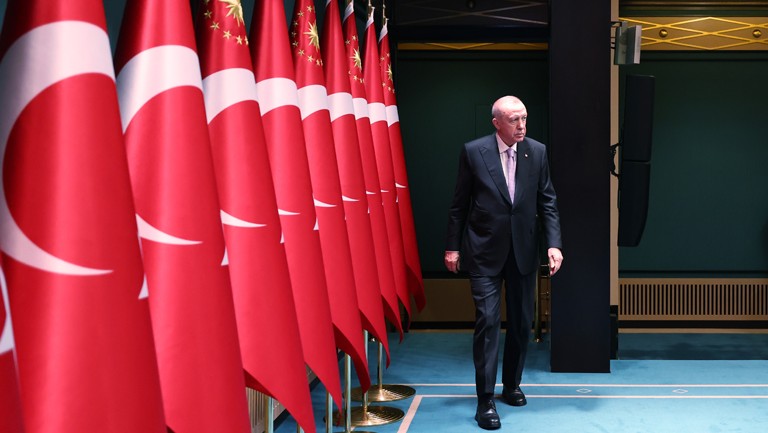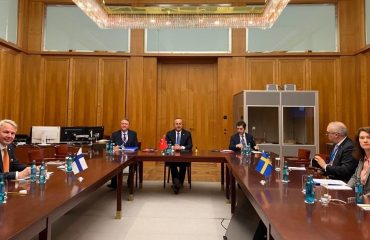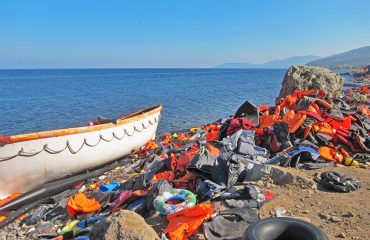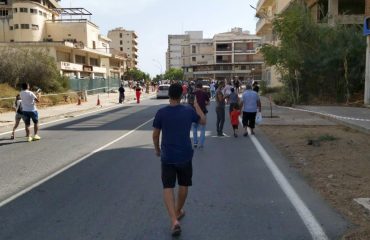

According to President Erdoğan, the PKK’s decision to “dissolve and end armed struggle” will open the doors to a new era not only in Türkiye but also in the region. There are important questions to be answered. (Photo: Turkish Presidency)
The PKK’s decision on May 12 to give up the armed struggle and dissolve itself means crossing another important threshold in terms of the possibility of ending the era of widespread political violence in Türkiye.
From now on, even if the process is undermined and fails to produce results, the outlawed Kurdistan Workers’ Party (PKK) has accepted that the path of armed struggle has come to an end.
There is no other example of an irregular war, in other words, guerrilla warfare, in the world that has lasted for nearly half a century, 47 years; the longest was in Vietnam, which lasted 19 years. In the words of a former Turkish President Süleyman Demirel, it is possible to say that the 30th uprising of the Kurds in history has practically ended as of May 12. After this stage, it should not be expected that groups within the PKK who do not accept the outcome, as happened in Ireland and Spain, will break away, refuse to lay down their arms, or engage in bloody acts will change this outcome.
The PKK is about to be taken out of the equation 11 years ago when it thought it was closest to achieving its goal of creating an independent Kurdish state in four countries with the support of the United States against DAESH (ISIS) in Syria; this is not only a military defeat, but also a political and ideological one.
PKK’s war is lost
Despite decades of costly mistakes, Türkiye eventually won; it is an example to be taught in future war history courses. It was the first guerrilla war won by British government forces since the Anglo-Boer War of 1899-1902.
In its congress resolutions, the PKK’s efforts to portray this outcome as almost its victory, perhaps to offset the reactions from within its militants, are striking. What is meant is that the Kurdish question has become visible as a result of the PKK’s armed struggle, which has cost Türkiye, Turks and Kurds alike, tens of thousands of lives and hundreds of billions in economic and incalculable political losses over half a century.
On the other hand, if the Nationalist Movement Party (MHP) leader Devlet Bahçeli had not asked Abdullah Öcalan, the PKK’s founding leader, who has been in the İmralı island-prison since 1999, to call on his organization to dissolve and lay down arms on October 22, and if Öcalan had not complied and made the February 27 call, would the PKK have said “Conditions have matured, we are quitting” at its May 5-7 congress? Let no one deceive anyone.
It is up to Bahçeli and Öcalan, who stand at the two extremes of Turkish politics, to open, in the words of President Tayyip Erdoğan, “the doors of a new era”.
Possible scenarios
In his speech after the May 12 cabinet meeting, Erdoğan said that the Turkish National Intelligence Organization (MİT) and other units of the state apparatus would closely monitor the process to “prevent any road accidents and to keep the promises made”. So, it was not the final curtain that closed.
According to political backstage talk, it seems that Turkish security forces will remain in Syria and Iraq for a while longer, both to see the possible breakup of the PKK into more radical groups that can continue the armed struggle and to complete the disarmament and dissolution aspect of the process.
There is unconfirmed information that six arms surrender stations will be set up in Dohuk, Erbil, and Sulaymaniyah provinces in the Kurdistan Regional Government of Iraq, and they will be under UN supervision.
There is no mention in the congress resolutions that the Syrian Democratic Forces (SDF), of which the PKK’s Syrian branch, the PYD/YPG, is the backbone, with US support, is part of this decision to dissolve and cease armed struggle. Nevertheless, Erdoğan said they assumed that the resolutions included both the Syrian and European organizations and the surrendering of their weapons.
There are also claims that 4,000 militants will surrender at the Turkish border and that at least 50 PKK top leaders will be sent to third countries, other than Syria, as refugees.
The government has a duty
There are two statements in the PKK resolution that have been reacted to by opposition voices.
One of them was the PKK’s mention of the July 24, 1923, Lausanne Treaty, which is considered the basis and precursor of the declaration of the Turkish Republic on October 29, 1923. The other was the naming of the Republic’s Kurdish policy as genocidal.
Not only the opposition parties but also within the ruling Justice and Development Party (AKP) are talking about “Lausanne” and “genocide”. That would be an unfortunate start if such PKK demands about legal and constitutional changes were carried to the Parliament. In his speech on May 12, Erdoğan said that either he or AKP officials would make more detailed statements in a few days.
It would be useful to make this statement as soon as possible.
How about the quality of democracy?
First, a large part of the public is not aware of what is going on. According to “Research İstanbul”s Türkiye Report, a majority of 65 percent are unaware of this process. Only 10 percent are aware of the government’s, DEM’s, and PKK’s decisions and follow them. If the public is to support the process, accurate information must be provided on time.
Secondly, from the execution law to the constitutional amendment, if the amendments only cover PKK cases and pro-Kurdish DEM Party mayors who are imprisoned on charges of aiding the PKK, and not, for example, Can Atalay, Osman Kavala, Selahattin Demirtaş, and finally Ekrem İmamoğlu, this would also be wrong. A clarification on this issue will ensure that the process turns into a real social peace.
All these points of doubt do not diminish the importance of the current stage. It only reflects the need to ensure that the goal of a “Terror-free Türkiye” is also instrumental in addressing the recent decline in the quality of democracy.


